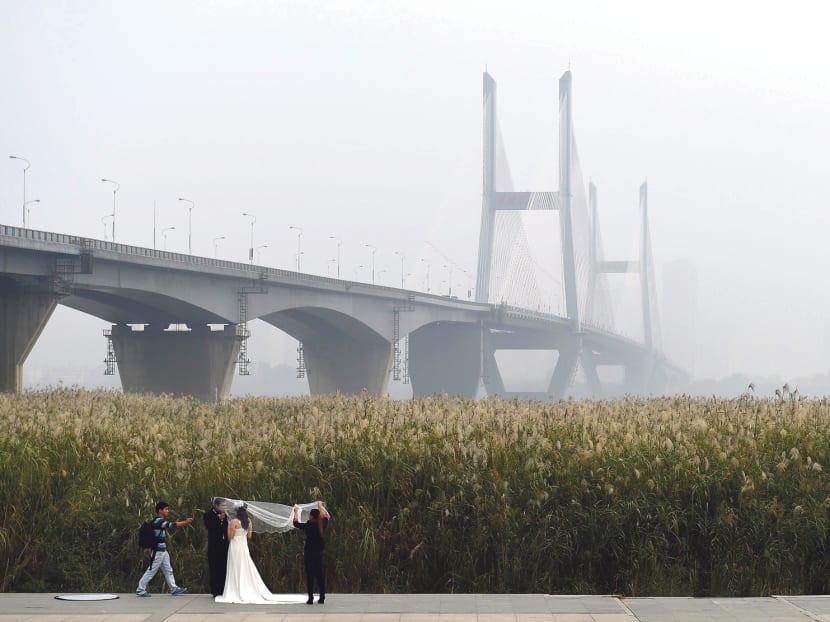Beijing residents get holiday to leave town ahead of APEC
BEIJING — China’s desire that blue skies and traffic-free streets greet world leaders at a summit in Beijing next week — after air pollution in the capital reached hazardous levels at least 10 days so far this month — is prompting the city to ask residents to go away.

Clean air and calm streets have become a priority for China ahead of the APEC summit from Nov 7 to 12.
Photo: REUTERS
BEIJING — China’s desire that blue skies and traffic-free streets greet world leaders at a summit in Beijing next week — after air pollution in the capital reached hazardous levels at least 10 days so far this month — is prompting the city to ask residents to go away.
The municipal government announced a week-long break for the Asia Pacific Economic Cooperation (APEC) forum to be held from Nov 7 to 12, shutting schools, limiting cars on the roads and encouraging travel agencies to offer discount vacation packages. That comes after the week-long National Day holiday early this month.
“The holiday in November is such a wonderful gift,” said Mr Tian Weiping, a literature professor at a university in Beijing. “I’d love to visit Hangzhou or Shanghai.”
China’s preparations for the APEC meetings go beyond cut-rate travel. Measures such as factory shutdowns are so sweeping that nationwide industrial production growth may be shaved by as much as half a percentage point this month and next month, while steel output in nearby Hebei province may fall 10 per cent next month.
The provinces of Hebei and Shandong will bear the brunt of output losses as Beijing curbs industrial activity to ensure clean air. Hebei will keep household heating “at the lowest acceptable level” unless “extremely cold weather” hits the region, the provincial government’s Department of Housing and Urban-Rural Development said.
The measures are aimed at preventing smog from enveloping the city during the event, which will be attended by United States President Barack Obama, Japanese Prime Minister Shinzo Abe and Russian President Vladimir Putin.
On Oct 19, pollution levels exceeding World Health Organization limits by 16 times prompted many runners to drop out of the Beijing Marathon and drew new attention to China’s difficulty in cleaning up its air despite promises to do so.
“China is paying a high cost to maintain its image. It’s making many efforts to erase long-lasting problems of bad air and traffic for the short period of APEC,” said Mr Bai Ming, deputy director of the Chinese Academy of International Trade and Economic Cooperation within the Ministry of Commerce.
“It just doesn’t need world leaders to see those troubles as it has been trying so hard to restructure the economy.”
The summit will cut industrial output growth by 0.3 to 0.5 percentage point this month and next month, Mr Dong Tao, chief regional economist at Credit Suisse in Hong Kong, said in an email on Oct 15. China’s industrial production grew by 8.5 per cent year-on-year in the January-to-September period, the National Bureau of Statistics said on Oct 21.
Preparing for APEC is “a political task that overrides everything in the city”, the Beijing Daily reported on Oct 8, citing comments from a city meeting. Mr Guo Jinlong, the city’s party secretary, encouraged residents to “publicise the capital’s and the country’s positive image”, the newspaper reported.
China has a history of efforts to clean up its air for events that put it in the global spotlight. When APEC was held in Shanghai in 2001, residents got a five-day holiday. China’s preparations for the 2008 Summer Olympics included the construction of a new terminal at Beijing’s airport, keeping many cars off the road, shutting down factories and deploying 110,000 security personnel.
“China always takes measures that are more radical than others to prevent negative factors from adversely impacting international events and tainting its image,” Mr Lian Ping, Shanghai-based chief economist at Bank of Communications Co, said in a phone interview. BLOOMBERG





